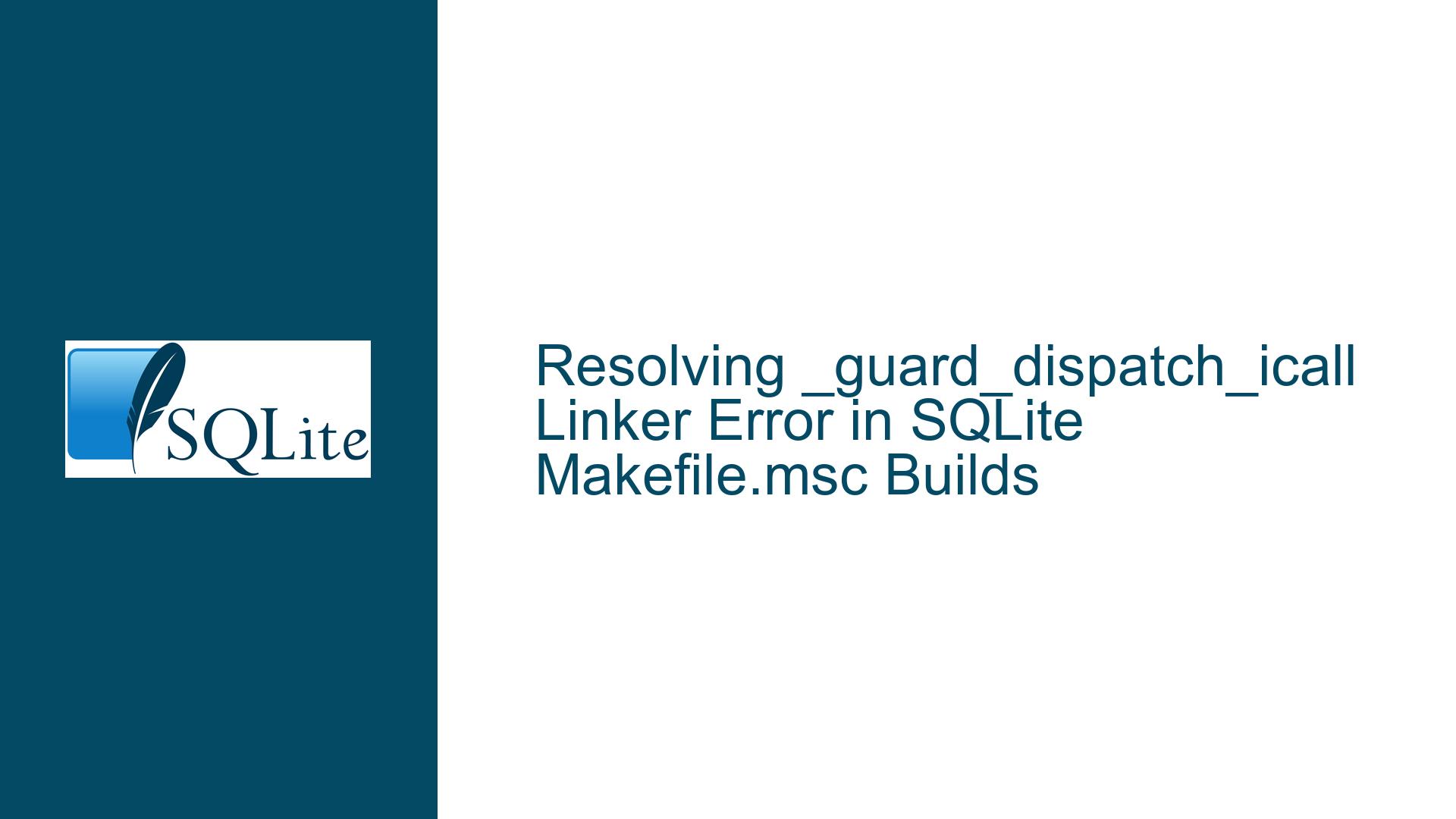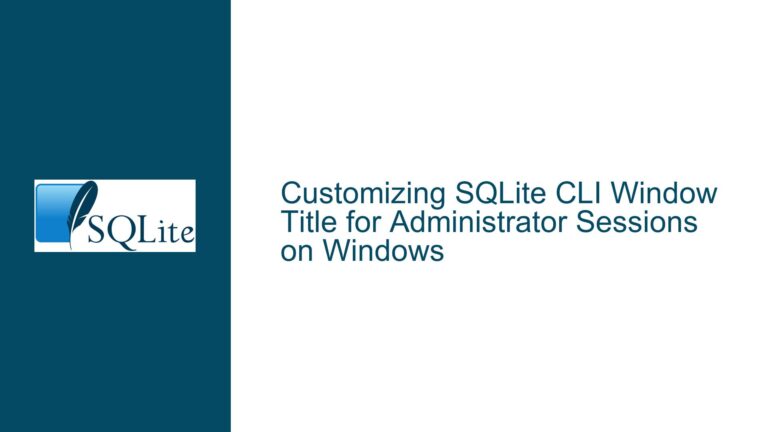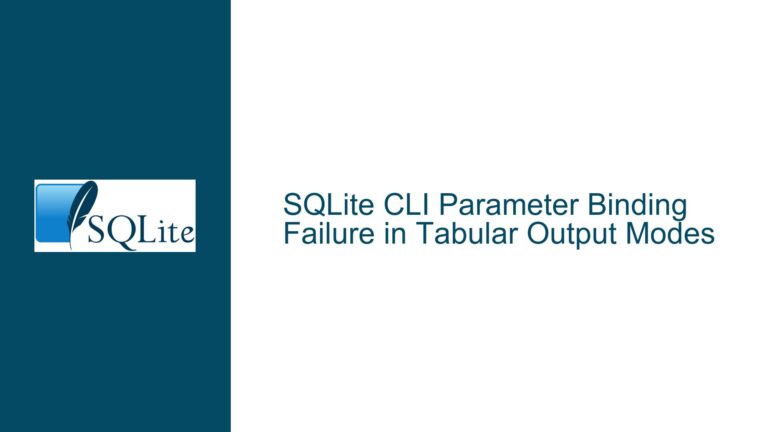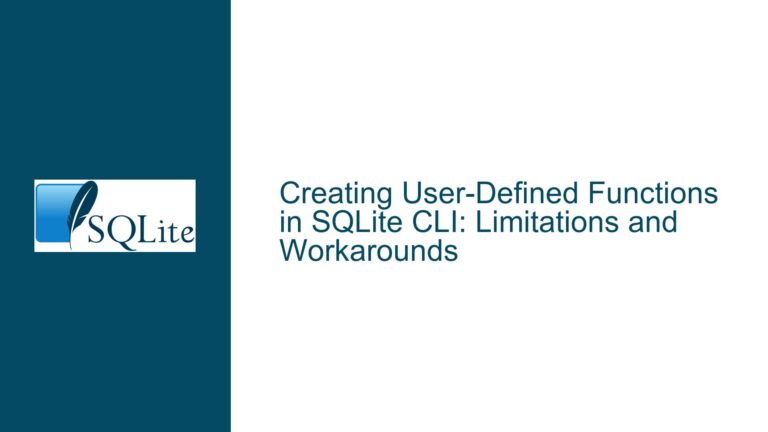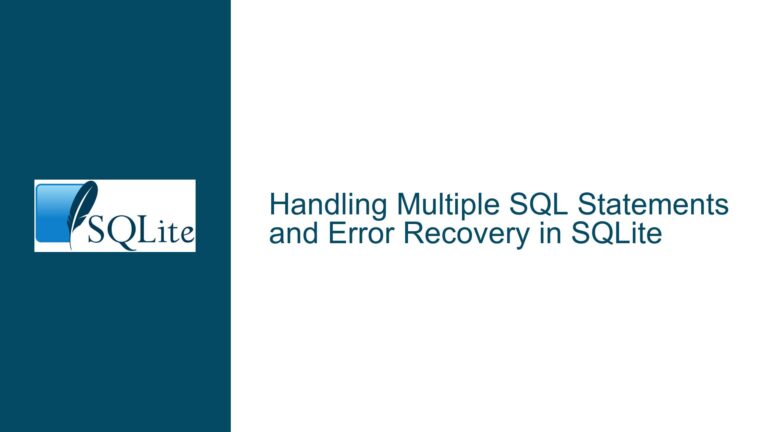Resolving _guard_dispatch_icall Linker Error in SQLite Makefile.msc Builds
Understanding the "_guard_dispatch_icall" Symbol Resolution Failure in MSVC Builds
Issue Overview
The "_guard_dispatch_icall" unresolved external symbol error occurs during the compilation and linking of SQLite using the Microsoft Visual Studio (MSVC) Makefile.msc build system. This error is specific to builds leveraging Control Flow Guard (CFG), a security mitigation feature designed to prevent memory corruption vulnerabilities by validating indirect function calls. When the build process enables CFG for the linker but neglects to apply it during compilation, the compiler fails to generate the necessary metadata for CFG enforcement. Consequently, the linker cannot resolve references to the CFG runtime checks (symbolized by _guard_dispatch_icall), resulting in a fatal "unresolved external symbol" error.
This issue primarily manifests in x64 builds using modern MSVC toolchains (e.g., Visual Studio 2022) due to stricter enforcement of CFG compatibility between compiler and linker phases. The Makefile.msc, which orchestrates the SQLite build process for MSVC, historically applied the /guard:cf flag only to the linker (via LDFLAGS), omitting it from the compiler invocation (TCC variable). This mismatch creates an inconsistency where object files lack CFG instrumentation, while the linker expects CFG-aware inputs. The error underscores the importance of synchronizing security-relevant compiler and linker flags in multi-stage build systems.
Root Causes of CFG Metadata Mismatch in SQLite MSVC Builds
Possible Causes
Incomplete CFG Flag Propagation to Compiler: The
/guard:cfflag must be passed to both the compiler (cl.exe) and linker (link.exe) to ensure CFG instrumentation is applied at all stages. If the flag is absent during compilation, object files will lack the required CFG call validation metadata, leading to linker errors when the flag is enforced during linking.Makefile.msc Configuration Oversight: The SQLite Makefile.msc defines compiler and linker flags in separate variables (
TCCfor compiler options,LDFLAGSfor linker options). Historically, the/guard:cfflag was added only toLDFLAGS, neglecting theTCCvariable. This oversight creates a scenario where the linker expects CFG-enabled object files, but the compiler produces non-instrumented code.Toolchain Version-Specific Behavior: Newer versions of MSVC (e.g., Visual Studio 2022) enforce stricter CFG compatibility checks between compiler and linker. Older toolchains might have tolerated missing CFG metadata in object files, but modern versions treat this as a hard error, necessitating explicit synchronization of the
/guard:cfflag across all build stages.x64 Build Specificity: The error is more prevalent in x64 builds due to differences in calling conventions and CFG enforcement policies between x86 and x64 targets. x64 builds require stricter adherence to CFG instrumentation rules, amplifying the impact of missing compiler flags.
Comprehensive Fixes for CFG-Related Linker Errors in SQLite MSVC Builds
Troubleshooting Steps, Solutions & Fixes
Step 1: Modify the Makefile.msc to Enable CFG During Compilation
Locate the TCC variable definition in the Makefile.msc, which governs compiler flags. Append the /guard:cf option to ensure CFG instrumentation is applied during compilation:
TCC = $(TCC) $(OPTS) /guard:cf
This modification ensures that the compiler generates CFG metadata, which the linker subsequently consumes. Validate that the /guard:cf flag appears in both the compiler and linker command lines during the build process.
Step 2: Verify Synchronization of Compiler and Linker Flags
After modifying the Makefile.msc, execute a clean rebuild to eliminate stale object files. Use the -nologo and -Bv flags with nmake to display detailed compiler and linker invocations:
nmake -f Makefile.msc clean
nmake -f Makefile.msc OPTS="-DSQLITE_ENABLE_FTS5" LDFLAGS="/guard:cf" /Bv
Inspect the output to confirm that both cl.exe (compiler) and link.exe (linker) receive the /guard:cf flag.
Step 3: Address Toolchain and Architecture-Specific Nuances
For x64 builds, ensure the Makefile.msc is configured to target the 64-bit toolchain. Verify that environment variables (e.g., PATH, INCLUDE, LIB) point to the correct x64 versions of the MSVC libraries. If using Developer Command Prompt shortcuts, launch the "x64 Native Tools Command Prompt for VS 2022" to avoid architecture mismatches.
Step 4: Handle Edge Cases and Advanced Scenarios
- Third-Party Code Dependencies: If SQLite is built with extensions or amalgamations that include external code, ensure all components are compiled with
/guard:cf. Mixed CFG/non-CFG object files can still trigger linker errors. - Static vs. Dynamic CRT Linking: Projects linking against the static CRT (/MT) may require additional CFG-related runtime library adjustments. Prefer dynamic CRT linking (/MD) for compatibility with CFG enforcement.
- Incremental Linking and Debugging: Disable incremental linking (
/INCREMENTAL:NO) and debugging symbols (/DEBUG) during initial troubleshooting to isolate CFG-related issues.
Step 5: Validate CFG Enforcement Post-Build
Use the dumpbin.exe utility to inspect the generated SQLite DLL or EXE for CFG metadata:
dumpbin /loadconfig sqlite3.dll | find "CF Instrumented"
A successful output should indicate "CF Instrumented" sections, confirming CFG is active.
Final Considerations
- Backward Compatibility: If targeting older Windows versions, validate that CFG-enabled builds function correctly on systems without CFG runtime support (Windows 8.1 and later).
- Performance Implications: CFG introduces minor runtime overhead. Benchmark CFG-enabled builds to ensure performance remains acceptable for your use case.
- Automated Build Pipelines: Update CI/CD configurations to propagate Makefile.msc changes across all build agents, preventing regression.
By methodically addressing CFG flag synchronization, validating toolchain configurations, and auditing build artifacts, developers can resolve the "_guard_dispatch_icall" error while maintaining robust security postures in SQLite deployments.
